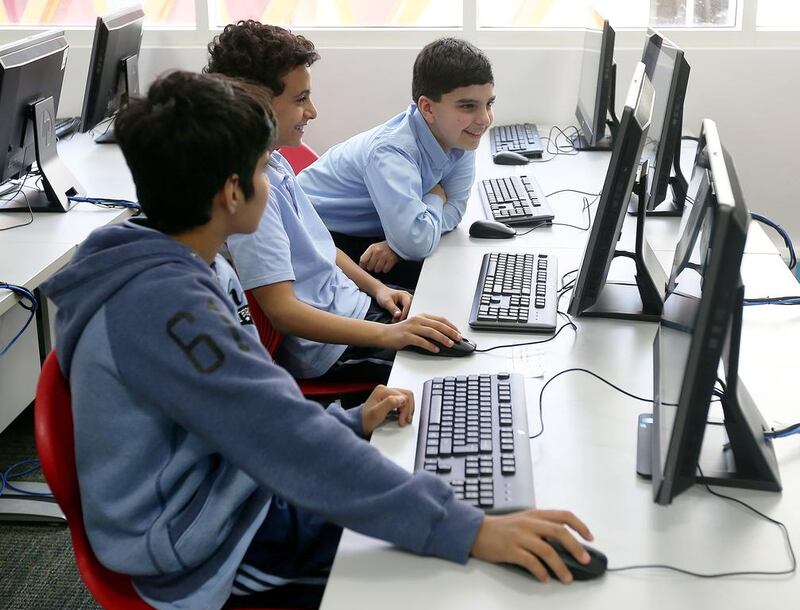ABU DHABI // A free computer science programme offered by Google is helping to transform public education in the capital.
The emirate has become the largest city in the world to embed the Computer Science First programme in its public school curriculum after the Abu Dhabi Education Council partnered with Google last year to enhance its computer programming education.
“We didn’t have any programming in our curriculum, and curriculum development takes a while,” said Nigel Crawford, programme manager for Adec’s P-12 curriculum sector. “So, we had something that we could immediately grab and make it available for teachers to use if they want. And that’s basically all we’ve said go out and use it.”
The programme first teaches pupils the basic concepts of computer programming through online clubs that use a programme called Scratch. Developed by the Massachusetts Institute of Technology, Scratch has a drag-and-drop interface that allows pupils build interactive games and animated stories.
Google provides all of the curriculum materials, video tutorials, online software and training for school staff. Public school information and communications technology teachers received one day of training to learn the programme before it was offered to about 30,000 pupils in Grades 4, 5 and 9 as part of a soft launch in September. Teachers will take a refresher course with Google this week.
Mr Crawford said all English, maths and science teachers from Grades 5 to 10 were being encouraged to integrate the programme within their classes. During the programme’s inaugural year, the pupils’ computer programming skills are not graded. “We’re asking them to try to integrate as much as possible, it’s a big challenge, which is why we’ve pulled the assessment piece out of it,” said Mr Crawford.
If the maths class taught by Danny O’Sullivan at Hamdan bin Zayed school, a state-of-the-art school that opened this year, is any indication, the programme is off to a positive start.
He said in addition to teaching computer programming, Computer Science First promoted independent learning, creative thinking and problem-solving.
“It’s a great way to integrate all the subjects together,” said Mr O’Sullivan, noting the work of one of his pupils as an example.
Khalid Zaabi, a 12-year-old Grade 7 pupil, created a game about the houbara. After importing all the design elements of the game – the houbara, falcons, a contaminated bush and a desert setting – Khalid animated the birds and created a script in which the player used a mouse to navigate the houbara to safety.
Fatima Al Bastaki, principal of Hamdan bin Zayed school, said helping children develop 21st-century skills has become a priority for schools.
“It was always Adec’s vision to focus on integrating technology,” said Mrs Al Bastaki. “This is one of the first priorities, to ensure the readiness of these children for the 21st century skills, problem solving by using the most innovative PCs around them. We are not denying that textbook that is an old source, no, textbook is a reference, but technology also is an area that supports the children’s learning and innovation.”
rpennington@thenational.ae






